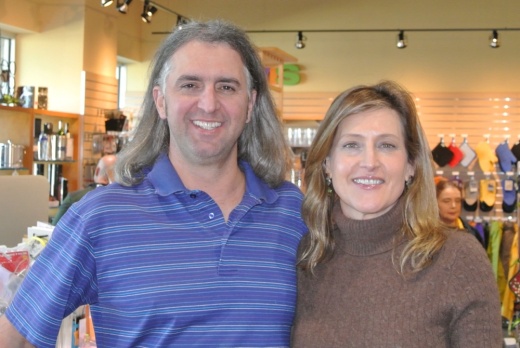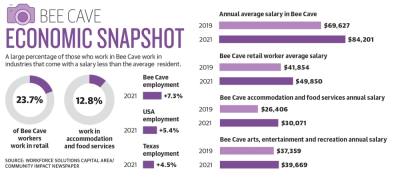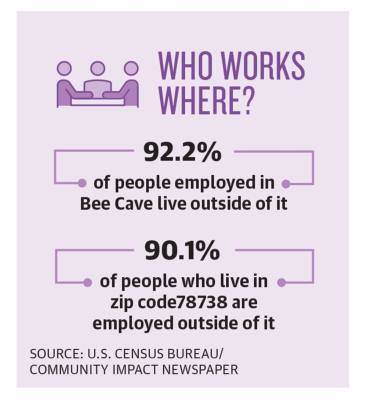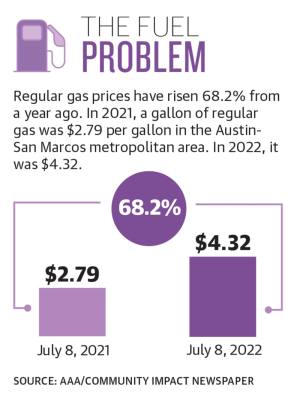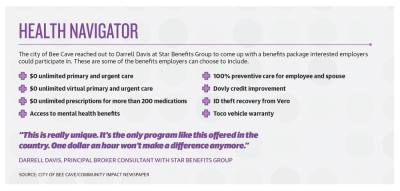Tackling transportation, how to provide benefits and housing were the top concerns employers said their employees face when it comes to their jobs.
“I’ve increased salaries by 30% to help them survive, and it’s still not cutting it,” said Tony Curtis-Wellings, owner of Faraday’s Kitchen Store in the Shops at the Galleria off Hwy. 71. “I’m throwing a lot of money at [staffing] right now just to keep what I have.”
Curtis-Wellings said transportation and living expenses are a hot topic on the showroom floor at his business where employees have experienced rent increases upward of $400 a month. "I think we’ve got to solve this quickly, because it’s really impacting us. We’ve really got to look at this hard and get serious."
“I think we’ve got to solve this quickly, because it’s really impacting us,” he said. “We’ve really got to look at this hard and get serious.”
John Dallas, general manager for the Sonesta Bee Cave Austin Hotel, said he has been able to hang on to most of his original staff, but if he did have turnover, “literally we would be dead. It’s really dire. The gasoline [prices rising] just adds to the fire.”
“We can’t find new people,” he said. “There’s just nobody out there—dishwashers, servers, housekeepers. We are riding with the people we have.”
Dallas said the issue of getting workers to the Lake Travis area to work service-based jobs is not new.
“Barton Creek Resort 10-15 years ago would take a van over to Target at Lamar [Boulevard] and [US] 183 and pick up [workers] every day at that spot and put about 10 people in a van and bring them back and forth,” he said.
Business owners brainstorming
Ideas presented to help with transportation included rideshare stipends, a carpool van that would drop off and pick up in centralized locations, and funding gas cards that could be given to employees.
Using rideshare to ferry employees to and from work did not seem like the best option for Sylvia Edwards, managing partner of Buenos Aires Cafe, since she said back-of-the-house employees do not usually have credit or debit cards or smartphones.
“I’m not saying we need to have a complete bus line, but at key times—in the morning, when shifts end in early afternoon and evening—bring them to a centralized area,” she said.
Edwards said she has been working the floor, kitchen and pastry positions because of the lack of personnel.
“We really need to focus on that kind of help,” she said. “I’m sure there are other areas that are in need in this respect.”
She also said the group should investigate if any grants from the federal, state or local governments with matching funds were available to assist with transportation costs, and she would be willing to contribute monthly to a fund.
King said bringing Capital Metro to Bee Cave is not realistic, since the city would need to raise property taxes by 10 times to contract for the service.
Proposed plans
Christy Black, franchise owner at Primrose School of Bee Cave, wondered if it would be possible to shuttle workers from Primrose’s Mueller location in one of the school’s buses, which sit unused after children are dropped off for the day.
She said even though it could get logistically hairy, it would be easy for workers to take public transportation to Mueller, then bus over to Bee Cave.
Area business owners were in agreement that raising money for gas would be the most immediate way to provide relief for workers being affected by rising prices.
An idea that was suggested was crowdsourcing transportation for lower-wage workers by posting a QR code at area businesses in partnership with the Bee Cave Chamber of Commerce, asking for donations to help provide funds for gas.
So far, city Communications Specialist Dori Kelley said nine businesses have pledged $380 each to a gas fund. She said the next step is figuring out how to distribute the funds.
The city also is working on a 78738 worker appreciation card, which would provide those who work in the 78738 ZIP code with 10%-20% discounts at businesses that sign on.
Another strategy the city worked on with Darrell Davis, principal broker consultant with Star Benefits Group, was a benefits package small businesses in Bee Cave could provide to employees at little to no cost.
Small businesses receive a tax credit when they provide employees with health insurance, which means if a company bought into the plan presented, it would be of no cost to the employer after receiving the tax credit.••The health insurance benefit includes $0 copay for primary and urgent care, $0 virtual primary and urgent care, $0 unlimited prescriptions for more than 200 medications as well as 100% paid for preventive care, access to mental health benefits, a personal health manager and a personalized health incentive program.
Davis also provided information on benefits such as credit improvement, ID theft recovery, an auto warranty; and Qwick staffing, which staffs food and beverage shifts in real time.
He said the benefits are tailored for workers like those in the service industry who are not looking for all the bells and whistles but has benefits they will actually use.
Davis said the benefits would include auto coverage to repair a beneficiary’s vehicle and provide a rental car with a copay. He said this solves a significant life event for an employee who otherwise would miss work when their car breaks down.
“This is really unique,” Davis said. “It’s the only program like this offered in the country. One dollar an hour won’t make a difference anymore.”
Davis also shared with the business leaders how to receive more funds via the Coronavirus Aid, Relief and Economic Security Act. These are funds business owners have already paid in as payroll taxes and can be refunded if they can prove their business was affected by COVID-19.
He is working as a mediary with Jorns and Associates, a company specializing in recovering economic stimulus funds for small businesses, to connect business owners who have been impacted by the pandemic recover lost income.
As for finding employees, Kelley said the city is planning job fairs in Oak Hill and monthly fairs at Lake Travis High School beginning in September.
The Oak Hill job fair will be used to recruit workers to more niche jobs, such back-of-house restaurant positions and senior living jobs, like certified nursing assistants.




